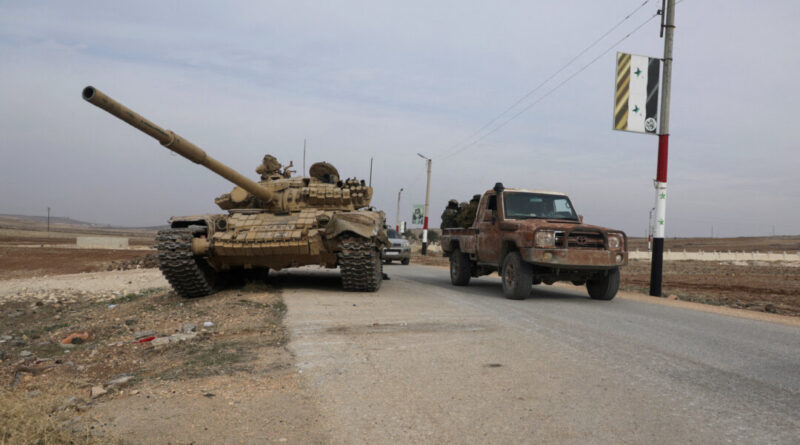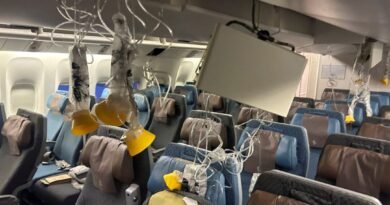Syrian Rebels Launch Expanded Assault as Assad Rushes to Defend Homs and Damascus
AMMAN/BEIRUT—Syrian rebels continued their rapid advance on Dec. 7, claiming control of most of the south, while government forces fortified their defenses in the central city of Homs to protect President Bashar al-Assad’s 24-year rule.
Following their capture of Aleppo a week ago, rebel forces quickly overwhelmed government defenses across the country, taking major cities and reigniting rebellion in areas previously considered subdued.
In addition to seizing Aleppo, Hama, and Deir al-Zor, rebels asserted control over southern Quneitra, Deraa, and Suweida, advancing to within 30 miles of the capital.
Government troops focused their efforts on defending Homs, launching airstrikes on rebel positions and reinforcing the city’s defenses, according to Syrian state television and military sources.
Meanwhile, rebels expanded their territory in the southwest, reportedly capturing Sanamayn along the main highway from Damascus to Jordan. The Syrian military acknowledged repositioning but did not directly address territorial losses.
The rapid developments have shocked Arab nations and raised concerns about regional instability, with Qatar warning on Dec. 7 of threats to Syria’s territorial integrity.
Syria’s civil war began in 2011 as a rebellion against Assad’s leadership, drawing in major external powers, providing a breeding ground for terrorist activities globally, and displacing millions of refugees to neighboring countries.
Western officials believe the Syrian military is struggling to contain rebel advances and is retreating in response.
Assad relied on allies, such as Russian airstrikes and support from Iran, Hezbollah, and Iraqi militias, to suppress the rebellion and take control of insurgent strongholds.
Russia, Iran, Turkey
Russian Foreign Minister Sergei Lavrov emphasized Moscow’s efforts to prevent “terrorists” from prevailing in Syria and called for dialogue between the Assad government and legitimate opposition groups, though specific factions were not identified.
Russia’s military presence in Syria, including naval and air bases, has supported Assad’s regime and enhanced Russian influence in the Mediterranean and Africa.
Hezbollah reportedly sent some monitoring forces to Homs but avoided significant deployment to avoid Israeli airstrikes, according to Western officials. Lebanon reported Israeli attacks on two border crossings between Lebanon and Syria.
Iranian-backed Iraqi militias are on high alert, with a large number of heavily armed fighters prepared to enter Syria, particularly near the border. Iraqi authorities stated they do not intend to intervene militarily in Syria.
Iran, Russia, and Turkey, the primary foreign supporter of the rebels, discussed the crisis in Doha and agreed on the need for an immediate ceasefire.
Senior Iranian official Ali Larijani met with Assad in Damascus, though no specific decisions were made regarding Syria’s future, as per Iranian Foreign Minister Abbas Araqchi.
British officials expressed zero tolerance for any use of chemical weapons in the conflict, alluding to previous incidents.
Battle for Homs
Rebels claimed to be on the verge of capturing Homs after taking the last village on its northern outskirts. Residents reported increased tension within the city, with airstrikes and gunfire intensifying and pro-Assad militias setting up checkpoints.
A successful takeover of Homs, a strategic crossroads linking the capital and the coast, would sever Damascus from Assad’s Alawite stronghold, as well as Russian naval and air bases in the region.
A Syrian military official noted a temporary pause in fighting on Saturday morning after intense rebel airstrikes, with a substantial troop convoy redeploying from Palmyra to reinforce the defense of Homs.
A coalition of rebel factions, including Hayat Tahrir al-Sham, called on forces loyal to Assad in Homs to defect, emphasizing the city’s critical importance in the conflict.
“Homs is key. If Assad loses control, Damascus will be isolated from the coast, cutting off vital supply routes,” said Jonathan Landis, a Syria expert at the University of Oklahoma.
The fall of Deraa, Suweida, and Quneitra in the south could pave the way for a coordinated assault on Damascus, the seat of Assad’s power, according to military sources.
Deraa holds symbolic significance as the birthplace of the uprising and is crucial due to its proximity to Jordan and its pre-war population of over 100,000.





